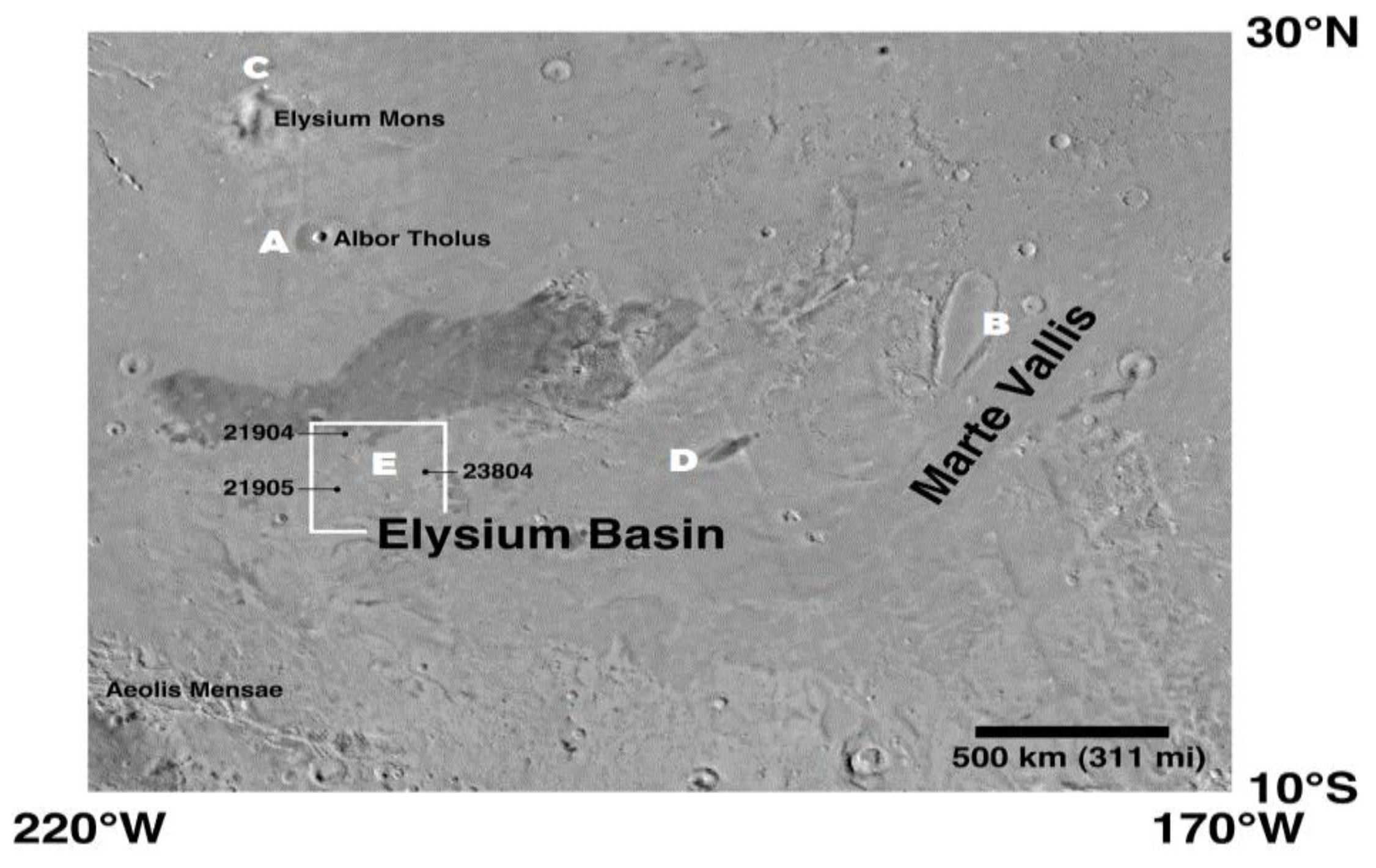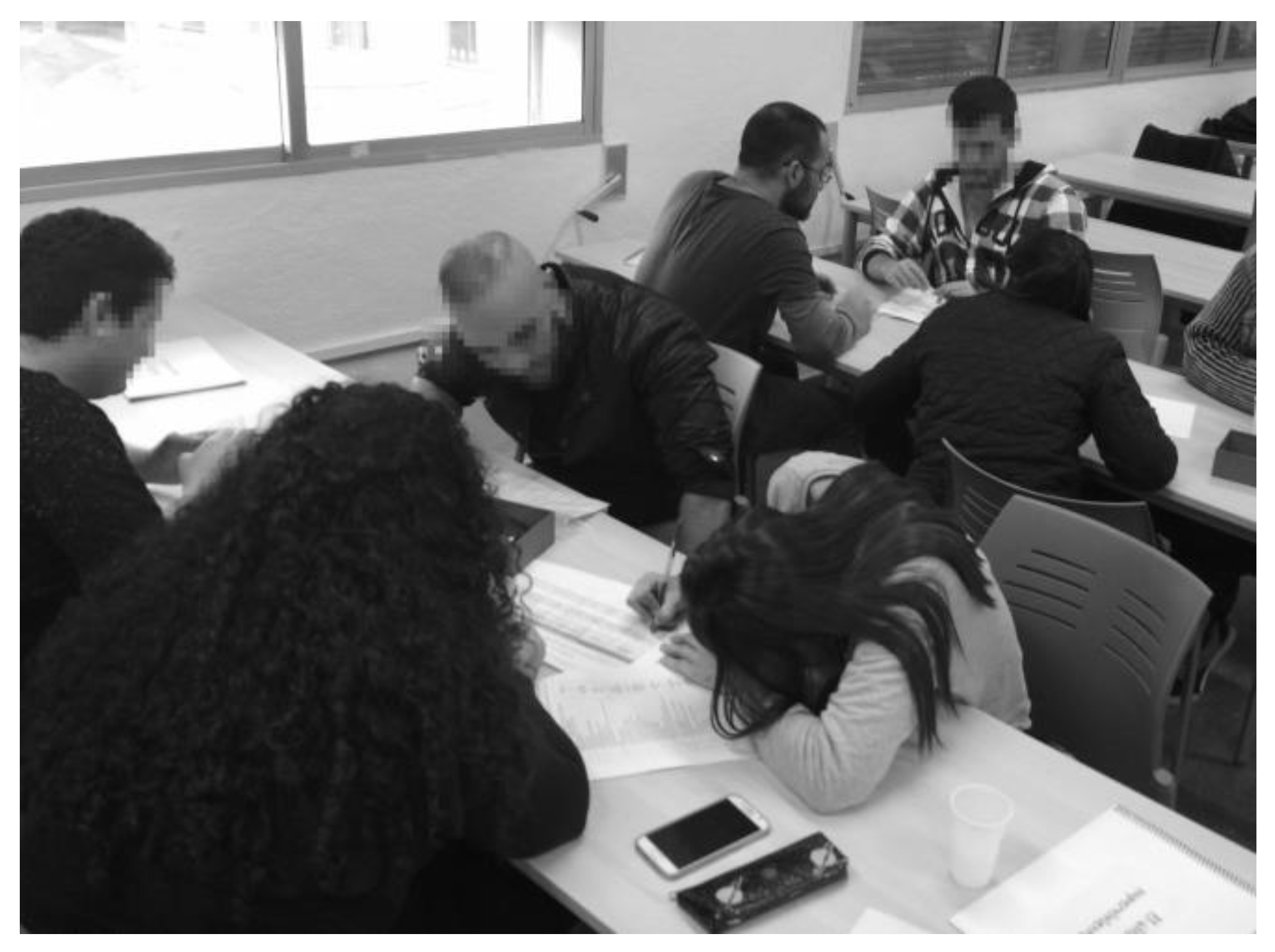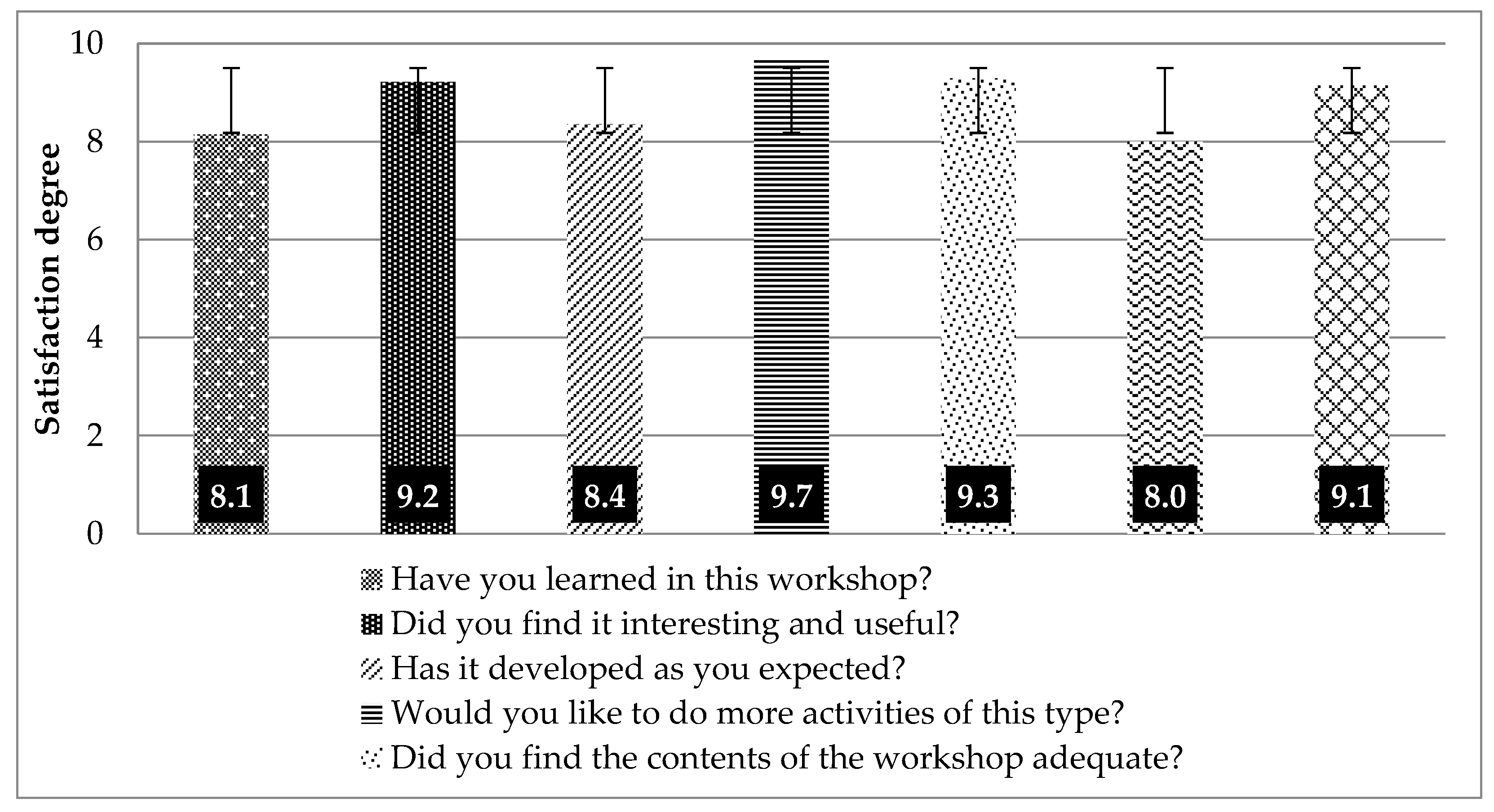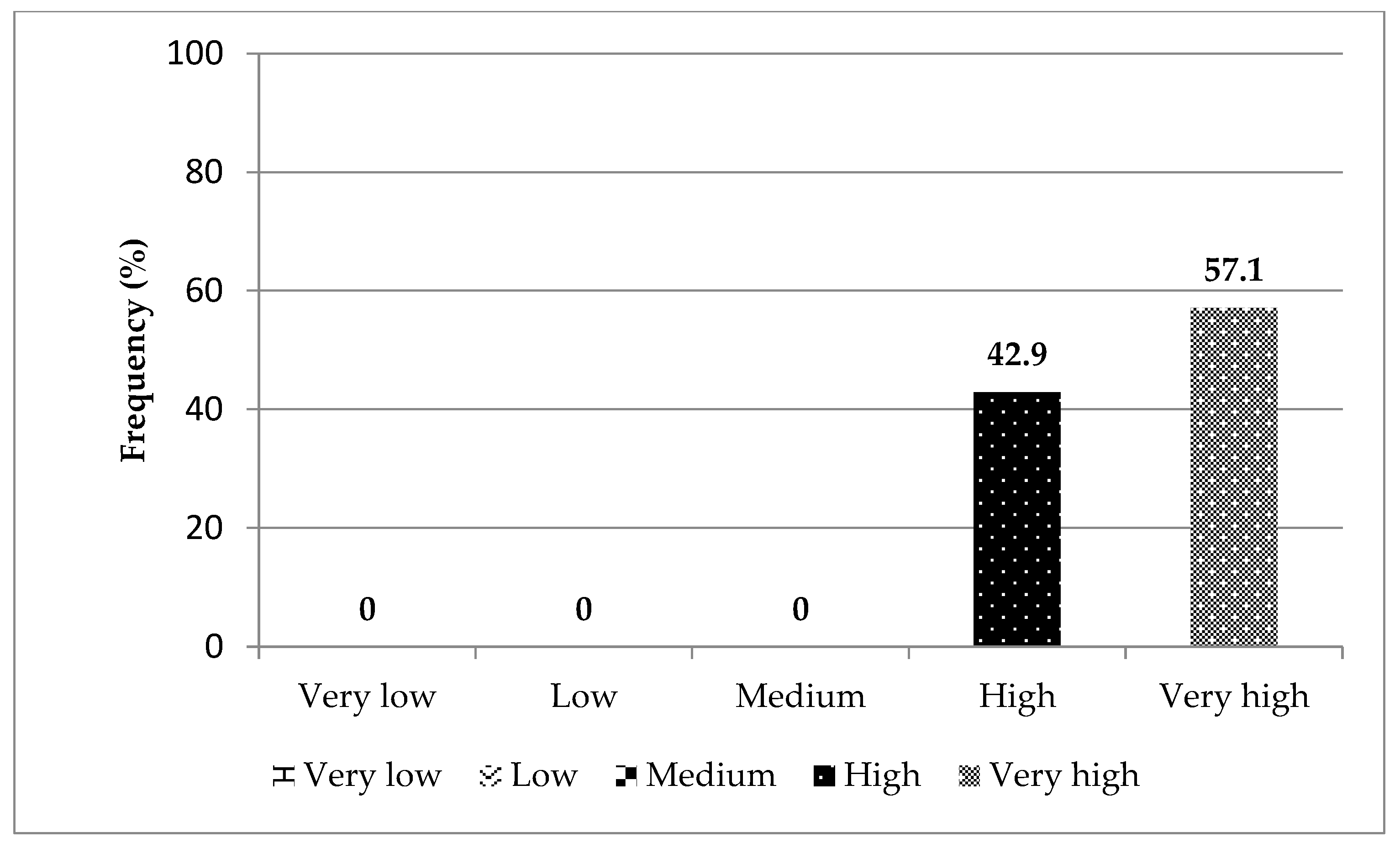Lockdown in Mars †
Abstract
:1. Introduction
2. Methodology
- ▪ Step 1: The participants were introduced to brainstorming. This is a group activity where the teachers possess a question or problem. This is followed by a flow of ideas from the students that end up with possible answers and/or ideas. In our case, the participants were asked to share what they thought the workshop was about, based on the title (“the last survivor”), and also what they know about Mars. The participants (pre-service teachers) could analyse how ideas and arguments flow in a debate and the capital importance of making good questions.
- ▪ Step 2: The four working groups received a “time capsule”; this is a kit containing all the materials needed to carry out the activities contained in the workshop. It consisted of a measuring tape, a stone, a magnifying glass, a wooden stick, a magnet, a needle, four different minerals, a plastic glass, a piece of glass, and finally, a piece of cloth. The participants had to analyse the kits and devise a way to find North on Mars. Since the kit contains a magnet and a needle—and by analogy to what happens on Earth—one may think that a compass is the solution to the problem. A compass relies on the existence of a global scale magnetic field (like on Earth), but Mars does not have such a field. The way to find North on Mars is to use the relative position of the shadow cast by the wooden stick. Both Mars and Earth have a similar rotational motion, and hence, the path of the Sun in the sky is analogous. In this activity, the participants analysed how to learn by doing and also by using similes (Earth–Mars) in the teaching-learning process.
- ▪ Step 3: A 1 m × 2 m mat (see Figure 1) with a printed scaled map of the Elysium Basin [9] on Mars, was used to analyse graphical data, in this case, cartographic data. This map was used as a blackboard to give general information about the Geology and Chemistry of Mars. Participants were asked to measure distances between different locations, taking into account the scale of the map. From a didactical point of view, the participants in the workshop learned how to combine direct instruction by a teacher with practical measurements carried out by them.
- ▪ Step 4: The participants learned how to use a dichotomous key to identify the minerals contained in the kit (see Figure 2). Moreover, and based on the chemical composition of the minerals, they had to discern which samples were in close contact with water and even the environmental conditions. This part of the activity is intended to show a more practical and engaging view of mineralogy, away from the standard learning by memorisation.
- ▪ Step 5: In the previous step, the participants in the workshop learned how to find evidence of water in mineral samples. Back to the mat, how to find the effect of water on the Martian landscape was explained. In analogy to what happens on Earth, the participants were asked to explain some geological features in terms of water dynamics. In this case, there is a combination of direct instruction by the teacher and observational skills by the students.
- ▪ Step 6: The participants filled an anonymous questionnaire to evaluate the quality of the workshop and ways to improve it.
3. Results and Discussion
- ▪ A series of seven evaluative questions: Did you learn anything new? Was the workshop useful and interesting? Was it what you expected? Would you like to participate in similar activities? What is your rating of the content? What is your rating in terms of the length of the workshop? Was it a fun activity? All the answers were rated from zero to 10, with zero being the most negative value.
- ▪ Two open questions: which aspect did you like the most? Additionally, which aspects would you change to improve the workshop? The answers were analysed by looking for the most repeated words, using the free online tool Textalyser [10]. The input information for this application consists of the set of answers given by the participants. The output of the application corresponds to the words most frequently used in the set of answers.
- ▪ General evaluation of the workshop, in terms of degree of satisfaction, with five possible answers, two positive (very high, high), two negative (very low, low) and one neutral.
- ▪ Other comments not included in the rest of the questionnaire, name “it was fun”, “it was boring”.
- ▪ Student 1: the design of the workshop as an adventure game could be engaging for kids.
- ▪ Student 2: the analysis of materials might raise the student’s curiosity.
- ▪ Student 3: to observe and manipulate minerals in a gamification context.
- ▪ Student 5: I rated the workshop eight out of 10, because I think it was short in time and we could have also spent more time working with the map
- ▪ Student 11: It should be longer
- ▪ Student 12: More time for activities related to exploration
4. Conclusions
Author Contributions
Funding
Institutional Review Board Statement
Informed Consent Statement
Data Availability Statement
Conflicts of Interest
References
- DECRETO 83/2016, de 4 de julio, por el que se Establece el Currículo de la Educación Secundaria Obligatoria y el Bachillerato en la Comunidad Autónoma de Canarias. Available online: http://www.gobiernodecanarias.org/boc/2016/136/001.html (accessed on 20 August 2019).
- Bennett, J.; Lubben, F.; Hogarth, S. Bringing science to life: A synthesis of the research evidence on the effects of context-based and STS approaches to science teaching. Sci. Educ. 2007, 91, 347–370. Available online: http://doi.org/bbss6k (accessed on 30 September 2019). [CrossRef]
- Alonso, M.B.A.; Aguado, M.E.G.; Martínez, M.T.L.; Galindez, M.C.M.; Uliarte, A.M. 84 Experimentos de Química Cotidiana en Secundaria; Graó: Barcelona, Spain, 2013; Volume 302. [Google Scholar]
- De Pro Bueno, A. Los contenidos de los proyectos curriculares de física y química en secundaria en la implantación de la reforma LOGSE. Enseñanza de las Ciencias 2007, 25, 367–386. [Google Scholar]
- Sanmartí, N. Didáctica de las Ciencias en la Educación Secundaria Obligatoria; Editorial Síntesis S.A.: Madrid, Spain, 2002. [Google Scholar]
- Moreno Mediavilla, D.; Pascual López, V.; Palacios Ortega, A. Uso de los laboratorios virtuales como TAC para el desarrollo de la competencia científica. In Jornadas sobre Investigación y Didáctica en ESO y Bachillerato, Proceedings of the Actas del IV Congreso de Docentes de Ciencias de la Naturaleza, Spain, 12–15 April 2016; González Montero, M., Baratas Díaz, A., Brand Fernándezi, A., Eds.; Santillana: Madrid, Spain, 2017; pp. 257–277. [Google Scholar]
- Foundation La Caixa. EduCaixa. Docentes en época de Confinamiento: ¿Cómo Percibieron los Docentes el Nuevo Escenario educativo? Available online: https://educaixa.org/es/-/docentes-en-%C3%A9poca-de-confinamiento-1 (accessed on 15 October 2020).
- Pérez Pinto, L.V.; Eff-Darwich Peña, A.M. Tan Claro Como el Agua: Su Potencial Didáctico en la enseñanza de la Física y Química; Universidad de La Laguna: Tenerife, Spain, 2019; Available online: https://riull.ull.es/xmlui/handle/915/14893 (accessed on 16 November 2020).
- Jet Propulsion Laboratory. Ancient Lakes on Mars? Results for Elysium Basin. Available online: https://photojournal.jpl.nasa.gov/figures/PIA01494_fig1.gif (accessed on 29 October 2020).
- Textalyser.net. (s.f.). Textalyser. Available online: http://textalyser.net/ (accessed on 31 October 2018).




| Question | Answer | Frequency | Percentage (%) |
|---|---|---|---|
| Which aspect did you like the most? | Mineral analysis. Practical content. Working in different areas. Gamification. | 10 3 2 2 | 71 21 14 14 |
| Which aspects would you change to improve the workshop? | Duration of the workshop, more time. Working with the map more time. Introduction to minerals. | 5 3 2 | 36 21 14 |
Publisher’s Note: MDPI stays neutral with regard to jurisdictional claims in published maps and institutional affiliations. |
© 2020 by the authors. Licensee MDPI, Basel, Switzerland. This article is an open access article distributed under the terms and conditions of the Creative Commons Attribution (CC BY) license (https://creativecommons.org/licenses/by/4.0/).
Share and Cite
Pinto, L.V.P.; Eff-Darwich, A. Lockdown in Mars. Environ. Sci. Proc. 2021, 5, 23. https://doi.org/10.3390/IECG2020-08743
Pinto LVP, Eff-Darwich A. Lockdown in Mars. Environmental Sciences Proceedings. 2021; 5(1):23. https://doi.org/10.3390/IECG2020-08743
Chicago/Turabian StylePinto, Laureen Vanessa Pérez, and Antonio Eff-Darwich. 2021. "Lockdown in Mars" Environmental Sciences Proceedings 5, no. 1: 23. https://doi.org/10.3390/IECG2020-08743
APA StylePinto, L. V. P., & Eff-Darwich, A. (2021). Lockdown in Mars. Environmental Sciences Proceedings, 5(1), 23. https://doi.org/10.3390/IECG2020-08743






